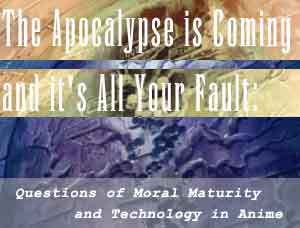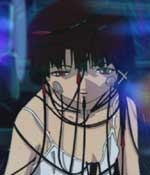by Dan Barry
 |
|||||
|
When the abuse of technology brings civilization to a screeching halt, don't expect the anime community to weep bitter tears. They've seen it coming for a while now. Even as early as Astro Boy, one of anime's thematic mainstays has been technology and industry. Japan knows, perhaps better than any nation in the world, that technology can be a double-edged sword. Anyone who has ever heard the names Hiroshima or Sony would be quick to agree with the above statement-yet despite these obvious qualifications, whenever the Japanese hint that technology's costs might outweigh its benefits, people are loath to listen. Japan is issuing a wake-up call through its art that is going conspicuously unnoticed-especially in America. The fields of animation and technology share a common ability to make the impossible possible; in this light, the art form of anime is equipped to offer particularly salient insight on man's relationship to technology. Anime shows a rare ability to think outside the box because it calls into question the hyper-consumerist culture that goes hand-in-hand with technological advancement. Movies such as Princess Mononoke and Ghost in the Shell, and series such as Serial Experiments Lain address the same issue: are we morally mature enough to handle our technological advancements responsibly? The answers from a range of different levels-be they social, environmental, political, or philosophical-are less-than-optimistic, if not outright damning.
Serial Experiments Lain is a television series that maps out the implications of the internet and wired existence. The series kicks off with a young schoolgirl committing suicide, convinced that she will continue to exist in a purely digitized form. Immediately, Lain raises questions of existence in forms other than the corporeal, putting a Y2K-compliant spin on the notion of the afterlife. What if all humans were simultaneously interconnected (an idea Neon Genesis Evangelion also examines)? And if dying only makes a person more interconnected, shouldn't everybody be rushing to kill themselves in droves, Heaven's Gate-style? Lain presents the internet as the harbinger of a new social consciousness. To participate is the height of conformity, and requires a total loss of privacy, but to opt out is essentially to delete oneself-and, unlike Lain's suicidal schoolgirl, this kind of deletion is permanent. Yet at its heart, Lain is not a series about technology, but about the interconnectedness between all people. Technology hasn't altered the fundamental ways in which we relate to one another, but it has increased pre-existing trends of social exclusivity and elitism. For those who have access, the internet has upped the ante of social interaction by making that connection more available and more complex. Conversely, those who do not have access are becoming increasingly marginalized or, in the parlance of the show, "deleted." This artistic metaphor is driven home by a frequent motif in the series-that of wires. Lain often stops while walking outside and looks up at the power cables overhead, and the only sound is the soft hum of the transformers. This reinforces the notion of technology's increasing ubiquity, and mankind's growing dependency on it. Lain comments that this reliance on computers and the internet has pushed the world into a precarious position: soon, we will either need to be connected all the time, or not at all. |
|||||
